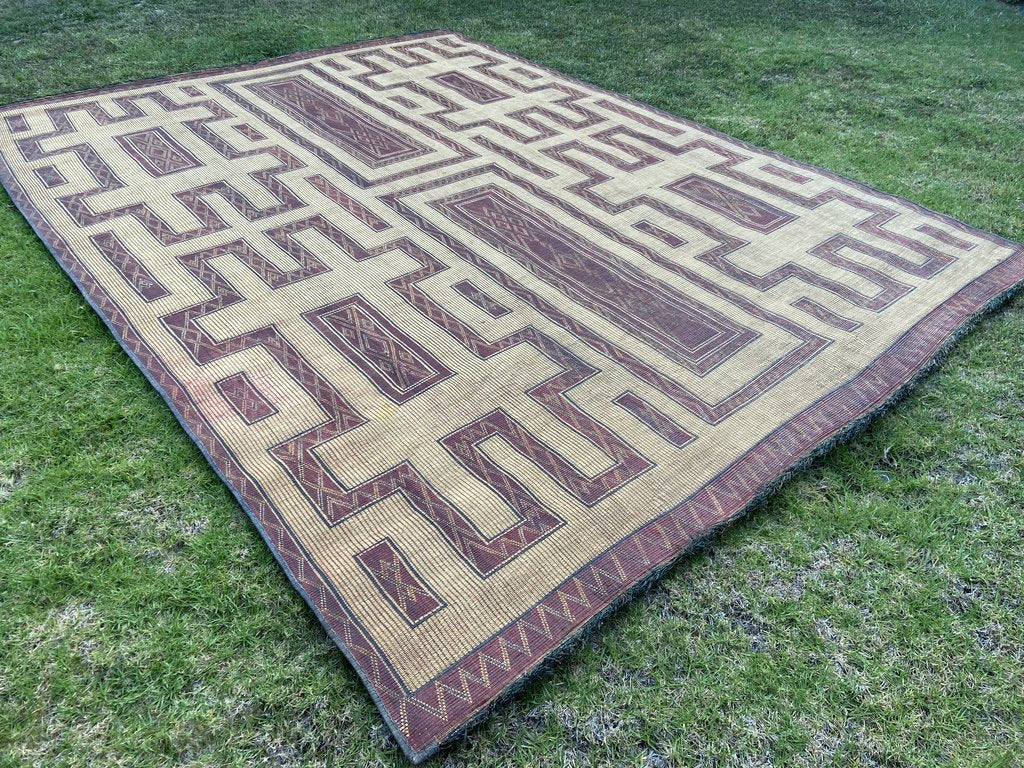The Tuareg of the Sahara and Their Movable Mats
The Tuareg of the Sahara and Their Movable Mats
In the Sahara in North Africa, a tribe sometimes called the blue people exist, a nod to their striking and elegant indigo head wrappings. The Tuareg tribe of Sahara are nomadic pastoralists who have long been considered desert warriors. In their culture, the men, not the women, are veiled with indigo wrappings that protect themselves against the harsh sun and climates.

The Tuareg Tribe
The Tuareg are descendants of the Indigenous Berber people who are not only warriors but also traders. They have long controlled the routes in and out of the Sahara, including Morocco, Mali, Mauretania, Niger, and Southern Algeria. In short, they have a hand in the trading system in this region.
The Tuareg has a rich and sophisticated culture that spans from traditions of sublime poetry, dance, song, and incredible visual works made by their artisans. The Tuareg’s particular caste of artisans creates mats from reed and leather, combining intricate motifs and forms of North African Islamic art and pre-Islamic art indigenous to North Africa.
Another visual art the Tuareg excels at is metalworking–jewelry that reveals elaborate pectoral pendants that have once been the inspiration for Hermes scarves featuring the Tuareg ornament.
The Tuareg Mats
The Tuareg mats that the tribe’s special artisans create are at the heart of every nomadic tent. Often, they also form movable walls. In Tuareg culture, women have exceptionally high status and independence. They are considered owners of the mats and tents that serve as the tribe’s communal space. And since the Tuareg are nomads, the mats are very lightweight and movable.
Tuareg mats are a symbol of a dying way of life. When they were made in the early 20th century, the Tuareg mats were designed to support a nomadic lifestyle, during which endless caravans moved through North Africa. As the Tuareg moved, they rolled up their homes built, covered, and furnished with the mats, primarily made with reeds, palm, and camel or goat leather, then stitched with designs.
The Tuareg Mat in Modern Design
Because of the intricate visual designs and remarkable craftsmanship of Tuareg mats, they have been a popular choice for interior designers in the modern age. The naturalness of the mats adds texture to a room as well as interest.
Tuareg mats can be used as a base for pots, stools, tables, or baskets. Their natural yet sophisticated look gives the furniture a bold look that isn’t heavy on the eyes. You can place these mats around your home in different designs to give it a classy appearance.
These mats also make good doormats decorated with salted lamps and stone baskets. They give a highly classy look that guests are sure to notice as they step into your home.
You can layer our neutral vintage mats to give them a softer yet improved style. Moreover, you can also lay Tuareg mats along your entryways.
The Tuareg mat also makes a good decor piece when combined with antique, plants, and stone-filled baskets. They also look great against monochromatic wall paintings or with Egyptian wall art hangings. They surely bring an unsolicited charm to your home.
Conclusion
The Nomadic lifestyle with which the Tuareg mat was born may now be disappearing. However, the craftsmanship and culture behind the intricate patterns of the Tuareg mat are very much alive. In the modern age, they are celebrated in the Sahara and anywhere in the world that features this beautiful mat.
Atlas Weavers is a fair trade artisan project supplying premier authentic Moroccan decorative rugs worldwide. We believe that language is the essence of one’s ethnicity, and the Tuareg speak and communicate their identity through their mats.
We provide a wide selection of prestigious Berber rugs, including the Tuareg mat. As the descendent of an artisan weaver, we aim to reveal the intricate craftsmanship of woven rags from the Sahara and show it to the world. If you also want to revel in this cultural heritage, get in touch with us!


